Fela Kuti, whose full names at birth were Olufela Olusegun Oludotun Ransome-Kuti, furthermore considered as Fela Anikulapo-Kuti, was brought into the world on October 15, 1938, in the ancient city of Abeokuta, Nigeria and died in Lagos, Nigeria on the 2nd of August, 1997.
Fela, who was an astute Nigerian songwriter and activist who debuted a modern-type of soundtrack called Afrobeat. This new music style bonded together Funk, Jazz, Blues with typical Yoruba tunes.
Son of a prominent civil rights activist mother, Funmilayo Ransome-Kuti and a school teacher father - the young Fela took an early interest in both percussions and the piano. His early love for music directed his steps in 1959 to study baroque music at Trinity College London. While in London, he came face to face with different musical styles and genres while playing the piano for both rock and jazz bands at the time.
Shifting base in the mid-1960s back to Nigeria, he recrystallized Koola Lobitos, a group he happened to be a part of back in London. The Afrobeat we all know today was given birth to during the frequent jams of the newly setup band.
Career:
Following his 1969 road trip of the United States, where he was affected by the dogma of Malcolm X, the Black Panthers, and some other activists at the time, Fela's songs became ever more daringly politicized. He inspired a vast wind of change in his songs such as "Upside Down," "Zombie," "Monkey Banana," and "Beast of No Nation."
Fela and his group, which was initially called Nigeria 70, and then later called Afrika 70, before metamorphosing into the Egypt 80, would hold the teeming crowd at his nightclub in Ikeja, Lagos, spellbound with a politically charged atmosphere asking for social change all wrapped in the soothing vibes of his Afrobeat music.
Fela's line of firebrand songs, sung in the two most popularly spoken languages of the region - English and Yoruba languages - did not go down well with the powers of the day. The then Nigerian military government always had a reason to illegitimately harass and arrest Fela, just because his music spoke frankly against the high spate of corruption and high handed.
Fela's brand of music appealed largely and gathered a large following from peoples who felt oppressed, marginalized or at disadvantage.
A short distance from his nightclub, the Afrika Shrine, Fela built a communal compound which he called Kalakuta Republica and presided over it as it's supreme head.
Sitting at the helm of affairs at Kalakuta Republic, Fela, almost always roused debate and captivated interest by publicizing polygamy (of which he married 27 women in a day), sexual indulgence and narcotics, marijuana in particular.
The Nigerian government launched a full out assault on Fela's Kalakuta Republic in 1977 which led to the death of Fela's mother and his being put behind bars shortly by the authorities. Due to the unabated tension of the previous year, Fela, next year embarked on exile to Ghana where he switched his name from Ransome to Anikulapo.
Dying of AIDS related complication in 1997, Fela Anikulapo Kuti all through his career always had it rough from the authorities of the day but interestingly, his political aspirations gathered wind in 1979.
Fela's life and career had adversely been affected by politics to which turn he formed a political party called the Movement of the People (MOP) under whose aegis he ran unsuccessfully for the position of President of Nigeria.
The year 1984 was rather a very ugly one for Fela as the authorities once again swooped on him, putting him away for 20 months on allegations of currency smuggling. On securing his release, Fela resigned from political activism and his son, Femi and daughter Yeni, at the helm of running his entertainment empire.
Fela is a music icon of repute whose fame did crisscross the global, back home in his country Nigeria, Fela has a museum in his memory; also his popular nightclub has survived to this day, but bigger and better and is now called - the New Afrika Shrine. His band the Egypt 80 band is managed by his younger son, Seun Kuti, who is a stunning replica of his father on and off the stage.
COMPREHENSIVE TIMELINE OF THE LIFE AND TIMES OF THE MUSIC LEGEND - FELA KUTI
"MUSIC IS A SPIRITUAL THING. YOU DON'T PLAY MUSIC. IF YOU PLAY WITH MUSIC YOU WILL DIE YOUNG. WHEN THE HIGHER FORCES GIVE YOU GIFT OF MUSICIANSHIP, IT MUST BE WELL USED FOR THE GOOD OF HUMANITY." ~ Fela Kuti
1938
Fifty miles of Lagos, on 15, October - Olufela Olusegun Oludotun Ransome-Kuti aka Fela is born in the ancient city of Abeokuta, Nigeria.
1946
Believing that studying music is an vital element of sound education, Fela's father spurs Fela on to start learning the piano.
1955
A sad event happens in the Kuti family, as Fela loses his father Reverend Israel Ransome-Kuti.
1958
Leaving the city of Abeokuta for London, Fela goes on to study music against the wish of his parents who wanted him to study to become a doctor.
1959
Fela puts together his first band, called Fela Ransome-Kuti and His Highlife Rakers. The band was lucky to sign a record deal with Melodisc (A pioneer independent African/Carribean owned British music label). There Fela Ransome-Kuti and his Highlife Rakers record four sides for the record company.
1960
Fela dissembled the Highlife Rakers and puts together Koola Lobitos which consisted of basically West African/Carribean musicians.
1961
Fela marries Remi and his first daughter, Yeni is born.
1962
This year is a year of aces for Fela, as he welcomes his first son, Femi, while also he graduates from Trinity College of Music.
1964
Drummer Tony Allen joins Fela's band, while Fela gets hired as a junior producer at NBC.
1965
Fela gets kicked out of NBC. Goes on to form another edition of the Koola Lobitos band.
1969
Fela and his Koola Lobitos band record a live album at the AfroSpot (later called Afrika Shrine) and commence a 10month tour of the US.
1970
Now Metamorphosed into Nigeria 70 band from the Koola Lobitos. Fela records a ten tracker in Los Angeles, that was later released in Nigeria as Fela Fela Fela - with his band.
1971
Fela's band metamorphose from Nigeria 70 to Afrika 70.
1972
The AfroSpot becomes the Afrika Shrine.
1973
The first fully packaged Afrobeat album, Gentleman, is released by Fela and the Afrika 70 band.
1974
Fela is wrongfully arrested and incarcerated, which give birth to his albums - Alagbon Close and Expensive Shit.
1975
Fela officially switches his last name from Ransome-Kuti to Anikulapo-Kuti (he who carries death in his pouch or pocket)
1977
In one of the most brutal assaults carried out on armless law-abiding citizens, 1000 soldiers storm and hold Fela's communal compound (Kalakuta) in Ikeja, Lagos State, Nigeria - to hours of raw terror and pillaging, after which they razed Kalakuta all down.
1978
In an elaborate traditional Yoruba wedding ceremony, Fela marries 27 women all in one day - in Lagos.
1980
Fela tours Nigeria alongside US funky jazz icon - Roy Ayers.
1981
Afrika 70 metamorphose into Egypt 80 and goes on its first European tour.
1983
A remarkable year for Fela as he make his cameo at Britain's Glastonbury. Fela welcomes son, Seun.
1984
An upcoming tour is cancelled as Fela gets arrested on currency smuggling allegations which leads to a 20 month incarceration.
1985
Fela gets recognized by Amnesty international and is conferred with the title - Prisoner of Conscience.
1986
Fela regains his freedom from jail as he makes his intentions known to run for the office of president of Nigeria.
1987
A ten 10th year series of events to mark the 1977 Kalakuta Invasion by the Nigerian authorities are held in Lagos, Nigeria.
1989
Fela and Egypt 80 tour the US and headline two shows with 'the Godfather of Soul Music" James Brown.
1992
Underground System, Fela's last studio album is released.
1997
This year is a rather very sad one for the music community as it lost a great legend and an originator, who impacted humanity even outside the sphere of music. Fela dies from AIDS complications. He receives a rousing farewell from over a million people.



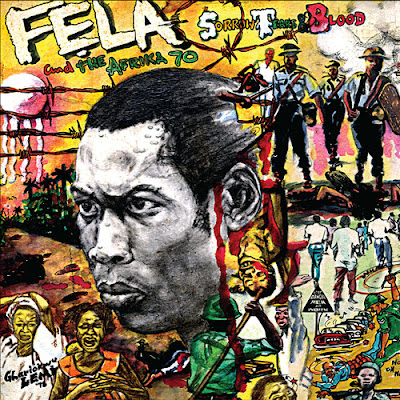
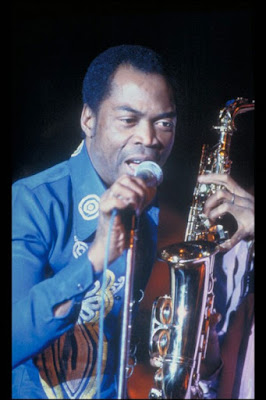




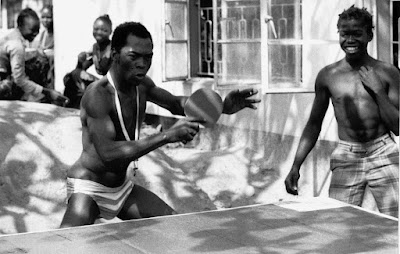

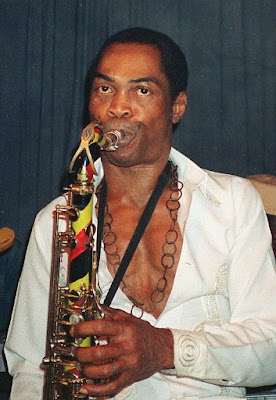
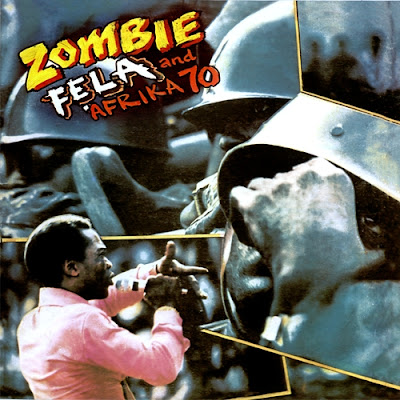

Comments
Post a Comment